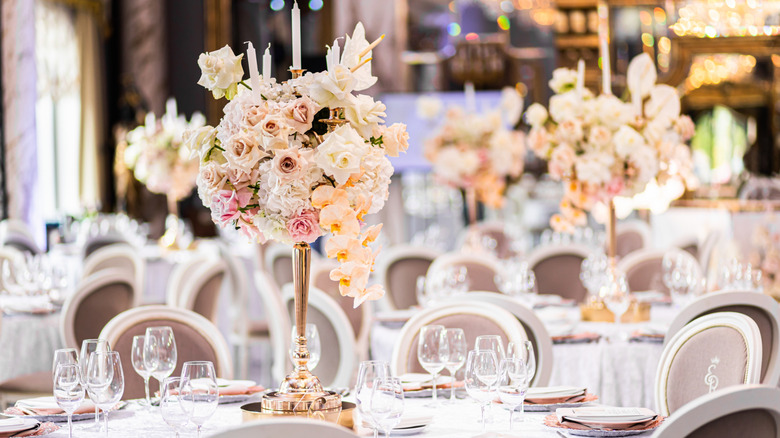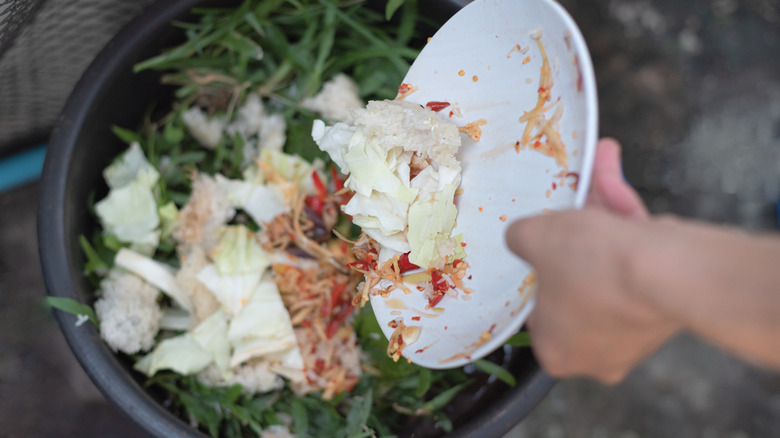11 Etiquette Mistakes To Avoid At A Rehearsal Dinner
A rehearsal dinner isn't just an uptight, prelude to the wedding; it's a chance to breathe a sigh of relief with close friends and family. Months of wedding planning and last-minute scrambling are coming to a close, and the special couple can spend some well-earned time making toasts, expressing gratitude, and connecting before the big day. Despite the night's celebrations, planning or attending a rehearsal dinner is challenging.
Everyone involved must take endless considerations and precautions in order for the evening to go on without a hitch. Mistakes like disregarding the dress code, showing up with uninvited guests, or whining and wincing at the menu can disrupt the night and ruin the atmosphere. But rehearsal dinner etiquette goes beyond textbook rules like keeping elbows off the table or placing your napkin on your lap. It's about thoughtfulness, respect, and contributing to the celebration. Whether you're the host or the guest, here's a guide to common rehearsal dinner faux pas to avoid —because a little mindfulness can make the difference between an awful evening and an exceptional night.
Not putting thought into your guest list
A rehearsal dinner usually involves close friends, family, and longtime colleagues, but it's imperative to go above and beyond to consider who truly needs to be there. The list will include those playing vital roles in the wedding, like the officiant, toast-makers, coordinators, and anyone the couple wishes to honor in an intimate setting. With that said, it's no surprise that an expertly planned guest list sets the stage for the entire event. The guest count provides hosts with an opportunity to select their serving style. For example, couples may consider tailoring small plated dinners for smaller groups, which can be a unique way to add to the evening's ambiance.
Even though it isn't easier than the small plated dinner, buffets are a classic option for larger parties. Hosts should closely collaborate with caterers to accommodate diverse palates and ensure adequate portion guidelines. The number of guests helps determine the amount of food and buffet stations needed, and a well-balanced list will make it easier to prevent over-ordering or shortages. In addition to crowd size, the atmosphere of the meal is heavily influenced by the personalities of those invited. Avoid inviting incompatible people, and equally, avoid overlooking key friends and family– such mistakes can enflame tensions and overshadow the dinner. By carefully thinking about who should attend, a well-planned and honest guest list makes for an intimate meal and an enjoyable night.
Neglecting dietary preferences
It's hard to think of an etiquette misstep as significant for a rehearsal dinner as neglecting dietary needs. An oversight like failing to accommodate allergies, dietary restrictions, or religious food requirements can demonstrate a lack of consideration from the host (not to mention stoking discomfort and exclusion among the guests). Before planning the minutiae of the menu, hosts should gather dietary preferences by requesting them with the RSVPs. Find out whether guests need allergy-safe foods, vegetarian meals, or gluten-free options so caterers can prepare accordingly.
Aim to seamlessly integrate accommodations into the menu by offering them alongside the standard options. For example, placing a gluten-free pasta option alongside the regular offering is an easy way for people to feel included and not burdensome. It's not just inclusive to offer options, it's a practical way to show guests that you value their comfort and enjoyment.
These expectations aren't just limited to the hosts. Guests are also responsible for informing coordinators about any dietary restrictions as early as possible — preferably when responding to the invitation. It's not feasible to expect accommodations at the last minute, and such a demand can come across as unfair to the host since many menus are settled weeks before dinner. Lastly, guests are encouraged to remain flexible and understand that despite everyone's best efforts, the menu may still fail to address all their needs. A seamless, inclusive, and harmonious experience hinges, in large part, on addressing dietary preferences early and thoughtfully.
Selecting the wrong venue
Selecting a venue for a rehearsal dinner is as much a culinary choice as it is about aesthetics. When you consider how food is prepared, enjoyed and served, the venue plays a critical role– and choosing the wrong space can lead to distracting logistical problems. Think of all of the space required for non-restrictive movement at self-serving buffet stations. Now think of all the times you've been at a buffet dinner or catered event where seating was too cramped and the whole night had a chaotic atmosphere. Conversely, a giant venue has the potential to make smaller dinners feel disjointed and expansive, resulting in an impersonal night that lacks the intimacy you may want.
As a host, choose the venue that aligns with both the length of the guest list and the type of meal being served. If you wish to control the ambiance for a plated, multi-course dinner, a private dining room will compliment the formality of the meal. For buffet-style service, you'd want guests to have ample space to move around freely without feeling trapped and congested. In order to encourage mingling and movement, select a venue that features easy access to table areas, food stations, and drink bars. Outside of space and logistics, consider whether the venue goes with the culinary vision in mind. A high-end, French bistro-style menu may not fare well in a rustic barn, and neither would smoked meats in an elegant ballroom.
With that in mind, you can bet on a cohesive, warm, and impressive evening for everyone present by thoughtfully selecting a complimentary venue that suits the dinner's style and the method of food service.
Arriving to the event famished
Arriving at a rehearsal dinner hungry sounds harmless enough, yet in the context of a formal rehearsal dinner, it can actually lead to unnecessary disruptions. Hunger can make us impatient, irritable, and distracted from the social expectations of the dinner. Guests can prepare for the evening by having a small snack beforehand, especially if the meal is scheduled for later in the night. Expecting food immediately after arriving at the event famished can stoke whispers of complaints and impatience during the toasts and other activities before the dinner. Asking coordinators for food outside of the caterers' menu or planned services can also add to the awkwardness and logistical challenges they already need to manage.
Hosts can account for this issue by providing drinking and small appetizers during arrivals. Large charcuterie boards featuring cheese, fruits, and small hors d'oeuvres can create a welcoming atmosphere while staving off hunger. Small offerings of water and light cocktails can ease guests into the evening and reduce any tensions and anxieties from their travels. Aside from such preparations, communication is equally important to the guests. If the food service is delayed, or there's a scheduled cocktail hour, everyone should be informed in advance so that they can plan accordingly. A rehearsal dinner is ultimately about connecting and celebrating a union, not just the food. Ensuring hunger doesn't interfere with the guests allows everyone to focus on the connection and celebration. A little preparation goes a long way!
Showing up with uninvited guests
Entering a rehearsal dinner with uninvited guests can potentially disrupt the intimate atmosphere the hosts worked hard to cultivate — how many comedy films include this exact premise? These dinners tend to be smaller and more personal gatherings than weddings, typically the product of a detailed guest list that the hosts mulled over for weeks. There are often precise head counts for seating and food quantity, with limited flexibility for unexpected plus-ones. Enough extra guests can leave invitees without a seat, reduce food options, and cause caterers to scramble to adjust. All of these factors add additional stress on the hosts. For guests, it's proper etiquette to respect an invitation exactly as written. If the invitation doesn't explicitly indicate a plus-one or children, assume they're not invited. If you're unsure, promptly reach out to the couple to clarify, though be prepared to honor their choice.
Hosts can prevent any confusion by using clear language on invitations. Statements like "Due to space limitations, we ask that only invited guests attend" can set effective, polite boundaries. RSVP instructions and deadlines can also allow hosts to finalize plans without surprises. If you're a host confronted with unexpected attendees, handle the situation graciously and firmly, but also discreetly. A discussion with the uninvited guest and the invitee who brought them along can help swiftly address the situation.
Not adhering to the dress code
The rehearsal dinner's tone and theme are often reflected in not just the venue, but the dress code too, and failing to adhere is a surprisingly common misstep. Showing up underdressed, overdressed, or inappropriately dressed not only makes you stick out like a sore thumb, but it also threatens to be a consistent distraction for the entire duration of the event. Following the dress code as closely as possible is a simple sign of appreciation for the hosts' efforts. The dress code details are usually included in the invitations with clues regarding the appropriate attire like, "black-tie," "evening wear," and "cocktail attire." If you're in doubt, it's better to be cautious and arrive slightly overdressed. Paying attention to these details and asking for early clarification from the hosts and fashion-oriented etiquette sources will help everyone look cohesive and aligned with the event's aesthetic (and for lots of photos too).
It's the responsibility of those in charge of the dinner to make dress code expectations very clear. Including a line like "Dress code – Black Tie" in invitations eliminates any ambiguity. For something more fun and thematic, providing examples– like "sequins and metallic" — will help guide your guests with minimal pressure. Guests who disregard the dress code entirely risk feeling both excluded and the center of attention at the same time — an uncomfortable limbo that could've been avoided with a little research. But, ultimately, the dress code is more than just for looks. It shows respect and a willingness to help contribute in your own way to the night's success.
Skipping the toast
Toasts may take various forms, but they're an undeniable, central component of the rehearsal dinner. It is a chance for guests and the host couple to come together in a showing of shared appreciation. Within countless cultures, the act of raising a glass during dinner symbolizes everything from gratitude to love, and connection. Toasts are frequently served as a prelude to the wedding ceremony, allowing for shared stories and expressions of love from friends and family. To skip this moment and head to the buffet to pile up your plate can come across as rude towards the effort and meaning behind the tradition.
An inclusive toasting experience is a reasonable expectation and should be just as important as honoring the custom. For the hosts, this means ensuring a variety of drink options for all guests, whether sober or abstaining for religious reasons. Offering mocktails and sparkling water means everyone present can participate, and creating a welcoming toasting environment where no one feels excluded should be the ultimate purpose. These thoughtful considerations will define your evening. Though many couples are opting out of the traditional champagne toast for alternative rituals, or even signature cocktails and non-alcoholic beverages, the raising of glasses is still a highlight of the evening. Guests should see it as a chance to bond, reflect, and celebrate before the big day.
For the guests tasked with offering a toast, aim for warmth and conciseness. Sure, rehearsal dinners are more relaxed than the actual wedding, but a beautiful toast adds meaning and connection to the event.
Being overly critical of the menu
It's important to remember that the menu you'll be enjoying is likely the result of weeks, perhaps even months, of planning. Hosts often balance countless dietary accommodations, spend considerable time taste-testing different dishes, and work within eye-watering budgets to create the perfect meal for their guests. It's not a stretch to say that being too critical of the menu through frequent complaints and negative comments can throw a wet blanket over the celebratory atmosphere. The menu may not be aligned with your exact preferences, but it's important to keep an open mind about the food. Focusing less on what you don't want and more on what you can enjoy will make the evening more enjoyable. Even if made in jest, expressing negative comments about a catered meal is poor etiquette and can be heard as disrespectful to your hosts.
Hosts should aim for options that balance creativity with crowd-pleasers by including their adventurous selections with classics everyone is bound to enjoy. This ensures that there's something for everyone, and variety also accommodates the necessary dietary preferences without creating a need for separate menus entirely. As a host, if you're considering including an unfamiliar or unconventional dish, consider explaining its story or significance on the menu. For example, if you'd like to include a special meal you once shared with your partner on vacation, share its special that! It's a small way to impart warmth and positivity to your guests.
Not considering food waste
Food waste impacts the environment and it reflects poorly on the dynamics of the rehearsal dinner. Wasting food comes across as inconsiderate of the hosts' time and money, especially for an event where catering is so carefully calculated. Leaving half-finished plates or taking more food than you can manage detracts from those weeks and months invested into the menu. As a guest, be mindful when serving yourself. Firstly, only take what you're positive you can finish, you can always go back for seconds if you're still hungry for more. Be aware of your portion sizes, especially if there are several courses with dessert to follow. However unintended, leaving excess food untouched on your plate and table sends the message that you did not appreciate the effort behind the meal.
Through working with caterers, hosts can minimize food waste with detailed planning. Things like realistic portions and menus featuring versatile and appealing meals are a start. In addition, smaller serving sizes with a multitude of options can encourage guests to try everything without feeling overwhelmed. Also, consider sharing leftover goody bags in an organized way at the end of the night — in conjunction with your caterers, of course. It isn't just about the money wasted when it comes to food waste, it's also about showing respect to the labor that went into the meal. Caterers often create menus designed to limit waste as much as possible, but being considerate is a way everyone can help contribute to a more sustainable, respectful night.
Taking leftovers without permission
While it might seem like no big deal to pack up extra food, taking leftovers without first consulting the hosts can appear presumptuous, even if you're just looking to limit food waste. Leftovers can be intended for someone else, or serve a different purpose, like a local donation. So, to avoid unnecessary tension with this etiquette mistake, ask permission. It's important to remember that leftovers belong to the host, and plans are often made in conjunction with catering for the additional food. They may want to save it for family or even offer it to vendors and staff as a gesture of appreciation for their tireless efforts. Staff handling food often have agreements in place for what happens with the surplus after the night's events, and taking leftovers without a heads-up can violate these agreements in place.
If you're unsure about whether leftovers are up for grabs, a polite inquiry is the way to go. Simply asking, "Would you mind if I took some of this home?" gives the hosts a chance to state their preferences. However, asking means you're prepared to accept a "no" without escalating. Proactively addressing the issue can cut through any misunderstandings for the hosts. For example, a station with containers and bags can be set up for guests to use.
Making the event too long
The dinner is meant to be a joyful prelude to the wedding. This means that stretching it too long can exhaust everyone involved, and this couldn't be more true for the couple and their family members. They're likely juggling last-minute wedding preparations, too! Timing is everything and a well-paced rehearsal dinner should include ample time for toasts, mingling, and dinner. Ideally, it should last no more than three hours, depending on the night's activities and the size of the guest list. One way to help things stay on track is to prepare a loose timeline in advance by allotting an approximate time for the cocktail hour, toasts, and the meal itself. Communicate this to key participants like the designated speakers for the toast
Guests can help maintain the pace by respecting cues and avoiding things like lingering too long after dinner or deciding to hold an impromptu toast. This will extend the evening beyond plans, especially if a handful of people do the same. If you notice the hosts looking fatigued, that's the cue to move on or wrap things up. Evading the night on schedule allows everyone to leave feeling ready and refreshed for the big day ahead.











